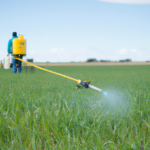The text discusses the value of fertilizers and biofertilizers in organic farming, highlighting the role of biofertilizers in promoting plant growth and enriching the soil without environmental damage. The importance of these products for agriculture in supporting auxiliary fauna and promoting a healthy ecosystem is highlighted. Emphasis is placed on the need to replace chemical fertilizers with biofertilizers and on the use of sustainable cultivation techniques to promote biodiversity and biological pest control.
In the current era of technological and scientific development, agriculture has undergone drastic changes. However, with the growing awareness about sustainability and the environment, it is necessary to adopt farming practices that are not only efficient but also eco-friendly. In this context, our article sheds light on farming techniques that favor animal husbandry, an essential and often overlooked component of organic farming. We will address key topics such as the importance of fertilizers and biofertilizers in organic farming, how agricultural products can benefit animal husbandry, and the vital role of animal husbandry in sustainable farming techniques. In addition, we will explore how the use of biofertilizers can encourage biodiversity in agriculture. This article is intended as a comprehensive guide for those looking to incorporate more environmentally friendly and, therefore, life-friendly farming practices.
- 1. "Fertilizers and Biofertilizers: Key to Organic Farming"
- 2. "How Agricultural Products Can Benefit Auxiliary Fauna"
- 3. "Sustainable Cultivation Techniques: The Role of Auxiliary Fauna in Organic Farming"
- 4. "The Use of Biofertilizers to Promote Biodiversity in Agriculture."
1. "Fertilizers and Biofertilizers: Key to Organic Farming"
Fertilizers and biofertilizers play a vital role in organic farming, contributing to soil enrichment and improved plant health. Biofertilizers, in particular, are a type of agricultural product that promotes plant growth without the harmful effects associated with chemical fertilizers. These natural products, obtained from living organisms, help improve soil fertility, increase nutrient availability, and promote healthy plant growth. Additionally, fertilizers and biofertilizers are an excellent tool for farmers seeking wildlife-friendly farming techniques, as these products do not harm beneficial organisms that contribute to the overall health of the agricultural ecosystem.
2. "How Agricultural Products Can Benefit Auxiliary Fauna"
Agricultural products, especially those used in organic farming, can significantly benefit wildlife. The use of environmentally friendly biofertilizers and fertilizers can help promote a healthy and balanced ecosystem where wildlife can thrive. These products not only nourish plants, but also improve soil quality, increasing its capacity to host a variety of beneficial microorganisms and creatures such as earthworms, pollinating insects, and insectivorous birds. Organic farming, which promotes the use of these agricultural products, is essential to maintain and enhance biodiversity, which in turn benefits wildlife, essential for natural pest control and pollination.
3. "Sustainable Cultivation Techniques: The Role of Auxiliary Fauna in Organic Farming"
In organic farming, auxiliary fauna plays a crucial role as a natural ally in maintaining the balance of the ecosystem. Through sustainable farming techniques, it is possible to encourage their presence and activity, which contributes to healthier and more environmentally friendly production. Chemical fertilizers, often used in conventional agriculture, can be replaced by biofertilizers, which are safer for auxiliary fauna and beneficial for the soil. Likewise, the use of agricultural products that do not harm these organisms is essential. Some techniques include crop rotation, the use of plant covers and the installation of shelters for auxiliary fauna. These actions, in addition to promoting biodiversity, allow for more efficient biological pest control, reducing the need for pesticides and promoting more sustainable organic farming.
4. "The Use of Biofertilizers to Promote Biodiversity in Agriculture."
The use of biofertilizers in organic farming is an essential technique that helps to promote biodiversity. Biofertilizers, unlike chemical fertilizers, are agricultural products that do not harm or alter the natural ecosystem. On the contrary, these organic fertilizers improve soil quality, promoting the growth of beneficial microorganisms that play a vital role in the nutrient cycle. Furthermore, by not containing harmful chemicals, biofertilizers contribute to the health of auxiliary fauna, such as pollinating insects and soil organisms, which are essential for maintaining biodiversity in agricultural systems. In short, the use of biofertilizers is a sustainable agricultural practice that benefits both the environment and agricultural production.
The implementation of sustainable farming techniques that involve the conscious use of fertilizers and biofertilizers is a crucial component to foster biodiversity and the well-being of auxiliary fauna in organic farming. Agricultural products, when properly selected and used, can significantly benefit these species, contributing to their survival and vital role in the health of our agricultural ecosystem. In short, the future of a prosperous and ecologically balanced agriculture lies in the adoption of agroecological strategies that favor biological diversity, thereby promoting the presence and activity of auxiliary fauna. The responsible use of fertilizers and biofertilizers is undoubtedly an essential part of this path towards a more sustainable and environmentally friendly agriculture.


